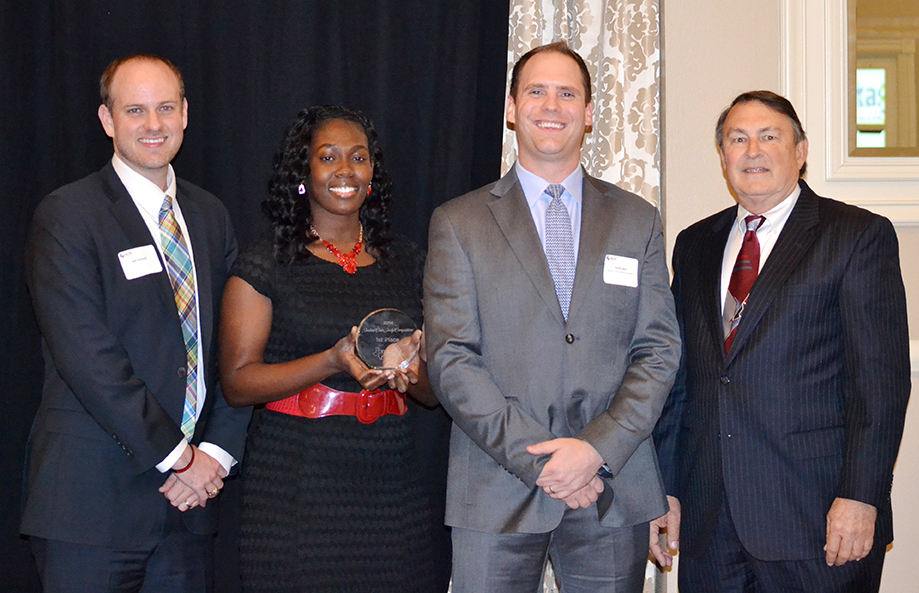
From left: Jindal School graduate students William Howard, Fallon Wallace and Keith Herl, seen here with Dr. Forney Fleming, director of the master’s in health care management program, placed first in a student case study competition.
A UT Dallas team that delivered advice to a novice CEO trying to fix a deluge of problems in his struggling health care company placed first and earned $3,000 in a student case study competition, sponsored by the North Texas chapter of the American College of Healthcare Executives (ACHE).
It was the third time in four years a team of students from Naveen Jindal School of Management won the annual challenge. The competition tasks competitors with analyzing hypothetical difficulties drawn from issues on the business side of medicine and then presenting proposals to remedy them.
Team members Keith Herl, William Howard and Fallon Wallace are all graduate students pursuing dual master’s degrees in business administration and health care management. Their challenge centered on a hypothetical 60-year-old company that had pioneered a nonprofit, prepaid health maintenance organization insurance program. The company’s initial market advantage lay in containing costs by relying on its own physician-led medical group to deliver care.
Over time, that advantage disappeared as competitors also adopted the HMO model. Subsequent economic pressures — including a $200 million operating loss in each of the previous two years — led to a dire financial situation as well as growing dissatisfaction among patients and the medical group, the Jindal School team concluded.
“The competition required our team to act as health care executives working together to immediately develop a strategy for the struggling organization,” Wallace said. “ACHE provided an invaluable experience for our team to have a glimpse of some of the challenges we will face in our career as health care management professionals.”
“Our team also took a hard look at the ‘what ifs,’ all the cost, quality and human implications and possible impacts of their advice. I think the judges appreciated that practicality. I believe the students learned to do that in our classes, and it reflects well on them, the excellence of our faculty, and the quality of the program.”
Dr. Forney Fleming,
director of the master’s in health care management program.
Ultimately, ACHE competitors focused on helping the company’s newly appointed CEO quickly find workable means to increase revenue and restore belief in the company’s viability.
For his inaugural meeting with his board of directors, the fledgling executive planned to propose two divergent rescue operations. The first entailed lowering rates, lowering costs, freezing salaries and instituting layoffs — all to regain a pricing advantage. The second choice: Change perception of the company by shifting away from operational efficiency in favor of top-quality service and care delivered at premium prices.
The Jindal School team’s first piece of advice was to forget the either/or approach. Instead, in a 15-page paper and a 10-minute presentation, the team counseled the CEO to combine his solutions in a two-pronged approach incorporating both short-term and long-term strategies.
Some key elements of the team’s short-term strategy called for immediate cost-cutting and strategic layoffs, a cultural shift to put “patients first” and aggressive searches to find new revenue sources in high-end, niche services.
In advisory sessions with team mentor E. Kenneth Hutchenrider Jr., president of Methodist Richardson Medical Center, and with Dr. Britt Berrett, director of the Jindal School’s bachelor’s in health care management program, the team talked about revenue enhancement.
“Hutchenrider and Berrett opened our eyes to these other lucrative areas that were not being tapped,” Howard said.
The team’s long-term strategies focused primarily on marketing the cultural shift, which included a new primary care model of assigning each patient to a primary care physician and assigning doctors and staff to treatment pods — teams that consistently worked together.
Crucial to all of this, the team said, was to garner as much support as possible by getting a core group of system leaders involved early.
“Our team also took a hard look at the ‘what ifs,’ all the cost, quality and human implications and possible impacts of their advice,” said Dr. Forney Fleming, director of the master’s in health care management program. “I think the judges appreciated that practicality. I believe the students learned to do that in our classes, and it reflects well on them, the excellence of our faculty, and the quality of the program.”
The competition took place Nov. 13 in Irving before the annual meeting of the North Texas ACHE, where results were announced. In addition to a trophy and the prize money, each team member earned student membership in ACHE and in the Dallas-Fort Worth Hospital Council.